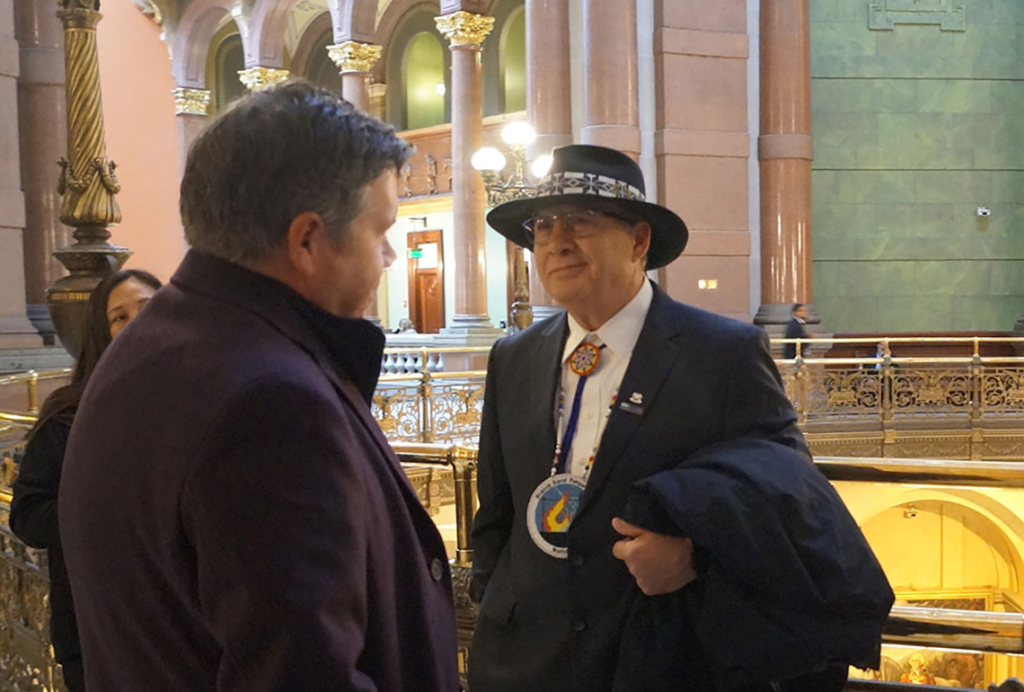
By PETER HANCOCK
Capitol News Illinois
[email protected]
SPRINGFIELD – Nearly two centuries after losing its reservation in Illinois in a land sale that most people now concede was illegal, the Prairie Band Potawatomi Nation could soon get its land back.
In the final hours of a lame duck session Tuesday, the Illinois House gave final approval to a bill authorizing the state to hand over to the tribe a 1,500-acre state park in DeKalb County, land that largely overlaps the tribe’s original reservation.
“You know, this has been a struggle,” tribal Chairman Joseph “Zeke” Rupnick said in an interview in the Statehouse rotunda while waiting for the House to take up the bill.
Senate Bill 867 is the culmination of nearly 20 years of negotiations between the tribe and the state. It authorizes the director of the Illinois Department of Natural Resources to deliver a quitclaim deed to the tribe for land that currently makes up Shabbona Lake and State Park.
The transfer of land, however, would be contingent on the state and tribe executing a land management agreement under which the park would continue to be operated as a park and open to the public.
“If there’s no agreement, there’s no transfer,” Rep. Will Guzzardi, D-Chicago, the bill’s chief House sponsor, said during floor debate. “The land does not get transferred with the passage of this bill. It is pending a land management agreement to keep the park a park.”
The Potawatomi Indians once occupied much of the Great Lakes region, but they were gradually displaced by growing European settlements. In 1829, the Treaty of Prairie du Chien granted the Prairie Band Potawatomi two square miles, or 1,280 acres, in what is now DeKalb County.
According to Rupnick, Chief Shab-eh-nay – after whom the park is named – and several members of his extended family lived on that reservation. But after passage of the Indian Removal Act of 1830, many other tribal members left Illinois, eventually settling in northeast Kansas, where the tribe is now headquartered.
But around 1849, Shab-eh-nay traveled west to Kansas to check on the status of tribal members there. While he was gone, the federal government declared the reservation land abandoned and sold it at public auction.
The legality of that sale, however, has always been in doubt because under federal law, tribal land cannot be sold except by an act of Congress. And since Congress never authorized that sale, and the tribe has never relinquished its claim to the land, all deeds and titles to that land have been legally clouded.
Most of the original reservation is now part of the state park, which the state acquired in the 1960s. But some portions of the original reservation are now occupied by private owners.
Rupnick said the tribe’s efforts to reestablish a reservation in Illinois began in 2006 when it purchased about 130 acres of farm land that had once been part of the original reservation. It also began petitioning the U.S. Department of Interior to take the land into trust as reservation property, which the agency finally did in April 2024.
“Once we started meeting with lawmakers down here (in Springfield), they realized that a majority of the original reservation was a part of the state park,” Rupnick said. “So DNR at that time said, ‘Well, since this is part of the reservation, what would you guys do if we said, let’s turn it over to you?’ And I said, ‘Well, we’ll take it.’”
Rupnick said the state legislation will go a long way toward permanently satisfying the tribe’s land claims in Illinois. In addition to pushing for SB 867, which now awaits Gov. JB Pritzker’s signature, the Prairie Band Potawatomi are also seeking federal legislation that would settle the tribe’s claims to remaining land on the original reservation site in exchange for a cash payment that would allow them to repurchase land currently in private hands.
Speaking on the House floor, Guzzardi said passage of the bill would be a small step toward correcting a historic injustice committed in America 175 years ago.
“I firmly believe that for all of our problems, America is the greatest country on Earth, and I’m proud to be American,” he said. “But I also don’t think that the answer is to turn a blind eye to the violence and the ugliness of our past, to rewrite the history books, to gloss over the unpleasant parts. I think the answer is to look our past square in the eye, the good stuff and the bad stuff, and when we recognize that we’ve done wrong as a nation, to see it, to own it, and to find some way where we can make it right.”
Capitol News Illinois is a nonprofit, nonpartisan news service that distributes state government coverage to hundreds of news outlets statewide. It is funded primarily by the Illinois Press Foundation and the Robert R. McCormick Foundation.






